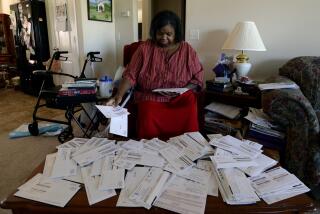Covering your share of costs
A move by a growing number of physicians to ask patients to pay their full share of an office visit (the co-pay, the deductible if still not met, and any coinsurance) on the day of the appointment could catch many consumers by surprise.
Say the coinsurance is 20%; an office visit with a $75 strep test could cost an extra $15 on top of a $20 co-pay. It could cost the full $95 if the deductible hasn’t been met. Similarly, having a complete physical before a deductible is paid up could make you responsible for hundreds of dollars on the day of the visit.
Randy Boyle, a staff attorney with the National Health Law Program in its Los Angeles office, recommends checking your health insurance manual, if you have insurance, to double-check the charges you must pay. No manual? Go online, or call the member number on your insurance card.
Mark Rukavina, executive director of the Access Project, a resource center on health insurance issues based in Boston, offers additional suggestions if you can’t pay the bill in full on the day of service.
* Approach the bill with a plan of how to pay, not how to avoid paying. You’ve been provided a service, and though you may have a hard time paying in full now, simply deciding to ignore the bill is not right, can hurt your relationship with the doctor and can harm your credit rating if the bill is turned over to a collection agency.
* Don’t put the bill on a credit card unless you’re sure you can pay it in full when the charges come due. Letting the charge go beyond even one credit card billing cycle adds an interest charge to the doctor’s fee, and could result in late fees and a higher interest rate if you’re late with your payment.
* Ask for a no-interest extended-payment plan from the physician’s office.
* If you are uninsured, ask for the rates charged to people who are covered by insurance. Those are generally lower.
* Ask if you can be billed, rather than paying the bill in full during the visit, especially if you aren’t carrying checks or the credit card you would prefer to use. But the credit card rules above still apply.
* Read the paperwork carefully. If the office agrees to a payment plan, be sure that’s what you’re getting and not a revolving line of credit or a credit card with interest.
* Because there’s a labor cost to processing and handling checks and paperwork, some doctors bristle at patients making tiny payments over a long period of time. If your doctor’s office balks at offering a payment plan, contact your church, synagogue or mosque -- such institutions often have funds for community members -- and see if it will pay the bill in full and then arrange to let you pay it back over time. Other people likely will need the funds you repay, so keep up your payments or let the fund administrator know if there’s a problem.
* If you feel intimidated talking over financial matters with the office staff, bring a friend or relative who can talk on your behalf without being combative.
* Don’t be shy about speaking with the doctor directly about your financial worries. “There is nothing wrong with asking to work something out,” says Jeffery Luther, head of the California Academy of Family Physicians.
--


